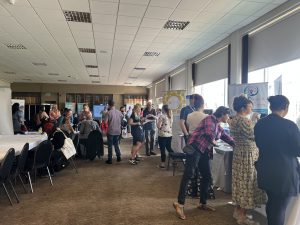The voluntary sector network that is helping to drive the transformation of mental health in Leicester, Leicestershire and Rutland met on Wednesday 21 June at the county cricket club to hold its second network meeting.

More than 100 voluntary sector partners (VCS), in addition to staff from the NHS and the local authority came together to discuss their projects and priorities for mental health.
Rehana Sidat from Jamila’s Legacy opened the event and said: “The voluntary sector is a key partner in the transformation work around mental health. Our agenda today is to listen to each other, share ideas and promote our work, alongside our partners in health and the local authority. I am delighted to see voluntary sector partners of all sizes here today and each one has an equal voice in this network.”
John Edwards, Associate Director for Transformation at LPT said: “The network is an important part of how we are working with and listening to our VCS partners. The organisations volunteer their time and expertise and they share a passion for improving the mental health of the people that they are working with. Many of the partners worked on the public consultation in 2021 and have continued to work with us. They have been joined by VCS partners running Neighbourhood Mental Health Cafes and those who received Getting Help in Neighbourhoods Grants.!
Better Mental Health for All is the collaboration of partners working on the transformation of mental health across Leicester, Leicestershire and Rutland. It is made up of partners from the NHS, the local authorities and the voluntary sector. The 90 VCS partners meet online and in person on a regular basis as a network to discuss issues, agree priorities and hear from statutory partners on any policy updates or key campaigns.
Feedback from delegates at the event on last week was extremely positive. Santosh Bhanot, who runs one of the Neighbourhood Mental Health Cafes from the Peepul Centre in the city, said: “This was a brilliant networking event. There was a focus on forging productive relationships and genuine collaboration. People are passionate about improving their services and the support they give to the local population.”
New to the network was Cairo Clayton from Freeva, a charity that helps people affected by abuse.
He said: “I have made so many connections today and I can’t believe that we didn’t join this network earlier. We have learnt so much today and this will help the people we work with when we are looking for more support for them.”
The event also marked the launch of a new approach across LLR to social prescribing – the Joy App – which was launched to stakeholders for the first time. It gave partners the opportunity to see how the app could work for their organisation and help to promote more support services to local people in need. Plans are now being put in place to roll out the software, working with the voluntary and community sector, the NHS and the local authorities.

